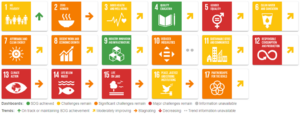In 2015, concurrently with the adoption of the Paris Agreement at COP21, the United Nations unveiled its 2030 Agenda, articulating a globally shared vision of a sustainable society encapsulated in 17 Sustainable Development Goals (SDGs). Swiftly embracing this framework, Japan established a national committee under the Prime Minister’s authority, launching various initiatives to raise awareness about the UN’s framework throughout the country.

However, Japan’s performance against these sustainability benchmarks has waned over the years. In 2023, Japan fell to the 21st position in the global comparison of nations’ progress towards the 2030 Agenda, a notable regression from its 13th rank in 2015. Specific challenges persist in areas such as Gender Equality (SDG 5), Responsible Consumption and Production (SDG 12), Climate Action (SDG 13), and Biodiversity (SDGs 14 and 15). Notably, Japan’s progress against the SDGs has slowed, with only one goal, No Poverty, deemed “On track” in 2023.
While the SDGs framework is widely recognized in Japan, concerns linger that its application is more symbolic than substantive. Despite the incorporation of the SDGs logos in various contexts, from educational materials to commercial advertising, there is a perception that companies and government agencies may not be fully committed to the tangible achievement of these goals.
Notable challenges persist in areas such as Gender Equality, where Japan’s ranking in the World Economic Forum Global Gender Gap report dropped from 116th to 125th in 2023. Additionally, Japan’s pursuit of carbon neutrality by 2050 faces criticism for lacking concrete action plans, with studies pointing to a misalignment with the Paris Agreement goals.
While Japan has made progress on clean energy under its G7 presidency, concerns persist regarding the low-ambition interpretations of international commitments. The ongoing strategic energy plan review, concluding in 2024, will play a pivotal role in determining the robustness of these commitments.
Despite Japan’s COP28 pledge to phase out “unabated new coal power plants,” this commitment is perceived by observers as non-significant. Private funding has already shifted away from such projects, and there is a global scientific consensus that unabated coal is incompatible with the Paris Agreement goals. Among G7, Japan is the only country that has not joined the Powering Past Coal Alliance (PPCA).
On the corporate front, while Japanese companies are enhancing their GHG emissions reporting and embracing international climate disclosure frameworks such as CDP and TCFD, some global investors are now expressing concerns about weaknesses in their low-carbon transition plans.
In resource conservation, Japan, once a leader in energy efficiency technologies, has untapped potential to further reduce its overall environmental footprint. Issues such as low regulation for building insulation and substantial food waste contribute to resource inefficiency. The total food waste in Japan, reaching a staggering 6 million tons per year, represents twice the total amount of global food aid or approximately one bowl of rice per day per Japanese citizen.
The European Business Council encourages Japan to transcend the symbolic use of the SDGs framework, advocating for transformative policies and business initiatives aligned with the 2030 Agenda. The EBC suggests importing and adapting methodologies, tools, and technologies used or developed by European companies. Increased attention to European policymakers’ regulations could drive investments towards enhancing Japan’s sustainability and social responsibility plans, fostering harmonized standards with the EU. The EU-Japan Green Alliance, signed in 2021 and gaining momentum in 2024, holds the potential to catalyze these exchanges.
Key issues and recommendations
While Japan has committed to carbon neutrality by 2050, progress in translating these goals into actionable plans has been slow. The need for faster implementation of concrete action plans for renewable energy sources, strengthened regulations against greenwashing, reduction of food and plastic waste, enhanced corporate disclosure (transition plans, supply chains, double materiality) and solid carbon pricing mechanisms are paramount to decouple economic growth from environmental degradation. Addressing gender equality challenges, enhancing science-based sustainability education for adults, and establishing robust regulations against greenwashing are essential to create a more inclusive and sustainable society.
-
Published:
Sustainability in Supply Chains
status:
Some progress -
Published:
Carbon Pricing
status:
Some progress -
Published:
Double Materiality Consideration
status:
New -
Published:
Low-Carbon Transition Plans Disclosure
status:
New -
Published:
Plastic Waste Reduction
status:
Some progress -
Published:
Food Waste Reduction
status:
Some progress -
Published:
Renewable Energy Support, Coal Phase Out
status:
Some progress -
Published:
Regulations Against Greenwashing
status:
New -
Published:
Science-Based Sustainability Education for Adults
status:
New -
Published:
Gender equality
status:
No progress -
Published:
Overall sustainability governance
status:
Some progress -
Published:
Climate action, responsible consumption and production
status:
Some progress
Chairman
Mr. Stéfan Le Dû
Sustainability Consultant & Educator
c/o European Business Council in Japan
Toranomon Hills Business Tower 15F
1-17-1 Toranomon, Minato-ku
Tokyo 105-6415
www.linkedin.com/in/stefanledu
Members
Upcoming committee meeting schedule
Please contact the EBC ([email protected]) to confirm the meeting location prior to attending
| DATE | TIME | LOCATION |
|---|---|---|
| 2025 | ||
| March 11 (Tuesday) | 0900~ | hybrid |
| June 25 (Wednesday) | 0930~ | hybrid |
| September 16 (Tuesday) | 0900~ | hybrid |
| December 9 (Tuesday) | 0900~ | hybrid |


